The sun dips below the horizon, casting long shadows across the rugged Baja desert. Dust billows in the air, the roar of engines echoing through the canyons. A battered, yet defiant, Ford Raptor charges through the final stretch, its headlights piercing the darkness. It crosses the finish line, triumphant, securing yet another Baja 1000 victory for Ford. This exhilarating scene isn’t just a one-off; it’s a snapshot of Ford’s legacy of dominance in truck racing.
For decades, Ford has been a powerhouse in the world of motorsports, and their success isn’t limited to sleek sports cars. Ford trucks, built for power and endurance, have carved their own path to glory, both on the high-speed ovals of NASCAR and the grueling terrains of off-road racing. From the iconic F-150 tearing up the track in the NASCAR Craftsman Truck Series to the Raptor conquering the unforgiving Baja desert, Ford truck racing is a story of innovation, determination, and a relentless pursuit of victory.
This journey spans generations, encompassing iconic models like the Bronco, the Ranger, and of course, the F-150, each contributing to Ford’s rich tapestry of racing success. As we delve into the history of Ford truck racing, we’ll uncover the stories of legendary drivers, groundbreaking technologies, and the unwavering passion that fuels this legacy. So, buckle up and get ready to experience the heart-pounding thrills and enduring triumphs of Ford truck racing.
The Early Days of Ford Truck Racing
The roots of Ford truck racing run deep, intertwined with the very origins of stock car racing itself. In the post-World War II era, as American car culture flourished, a new form of motorsport emerged: stock car racing. Ford, with its popular F-Series trucks, was quick to recognize the potential of these rugged vehicles on the racetrack. What began as grassroots efforts to modify Ford trucks for competition quickly evolved into a full-fledged Ford truck racing program.
Pioneering Models
One of the earliest Ford trucks to make its mark on the racing scene was the F-100. Introduced in 1948, the F-100, with its robust frame and powerful V8 engine, proved to be a natural fit for racing. Enthusiasts and mechanics alike saw the truck’s potential and began modifying it for both on-road and off-road competitions. These early Ford racing trucks, often homemade and driven by passionate individuals, laid the groundwork for Ford’s future dominance in truck racing.
The F-100 wasn’t the only Ford truck to find success in these early days. The larger F-Series trucks, like the F-250 and F-350, also began to make their presence known on the track. These trucks, with their even greater power and towing capacity, excelled in off-road events, where their durability and strength were put to the ultimate test.
Key Races and Victories
As Ford truck racing gained momentum, Ford-powered trucks began to rack up victories in various races across the country. In the burgeoning world of off-road racing, Ford trucks proved their mettle in events like the Mint 400 and the Baja 1000. These grueling races, known for their challenging terrains and unpredictable conditions, showcased the resilience and performance of Ford racing trucks.
On the paved ovals of NASCAR, Ford trucks also started to make a name for themselves. The F-100, in particular, became a formidable competitor, with drivers like Curtis Turner and Marvin Panch securing wins in the early NASCAR Convertible Division races. These early victories not only solidified Ford’s presence in NASCAR but also fueled the growing popularity of Ford truck racing among fans and enthusiasts.
The early days of Ford truck racing were a time of experimentation, innovation, and the relentless pursuit of speed. These pioneering efforts laid the foundation for the legacy that Ford would continue to build in the decades to come, a legacy marked by groundbreaking technology, iconic drivers, and a passion for racing that has captivated generations.
Ford in NASCAR: The Rise of the F-150
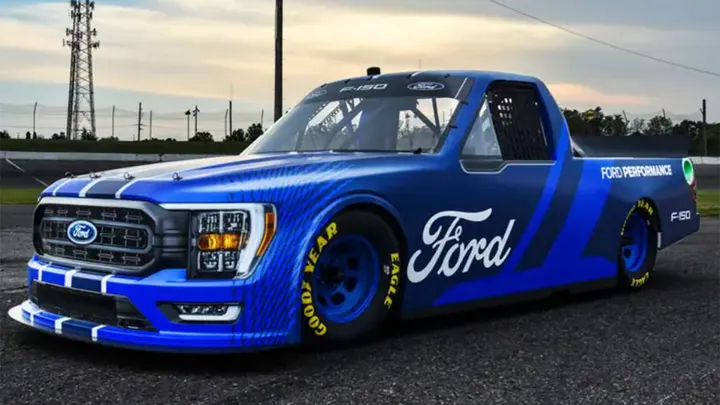
The inception of the NASCAR Craftsman Truck Series in 1995 (originally known as the NASCAR SuperTruck Series) heralded a new chapter in Ford truck racing. This series, showcasing modified pickup trucks on high-speed ovals, provided Ford the perfect stage to flex the muscles of its F-150, a truck renowned for its power and durability. NASCAR’s loyal fanbase, combined with a new audience attracted to the raw power of truck racing, propelled the series to national prominence.
F-150’s NASCAR Dominance
The F-150 didn’t just compete in the NASCAR Craftsman Truck Series; it dominated. Right from the start, it proved to be a force to be reckoned with. Its combination of a robust V8 engine, meticulously honed aerodynamics, and a rugged build, honed for enduring the harsh demands of racing, made it a top contender. Over the years, the Ford F-150 has amassed an enviable collection of trophies, with a string of Manufacturers’ Championships and Drivers’ Championships that underscore its dominance.
Names like Greg Biffle, who clinched Ford’s first series championship in 2000, are etched into the annals of NASCAR history. His triumph marked the beginning of a Ford dynasty, with the F-150 consistently proving its mettle year after year. The truck’s success isn’t merely a reflection of its inherent capabilities but also a testament to the tireless dedication of Ford’s engineers, mechanics, and drivers, all working in harmony to push the boundaries of performance.
Legendary Drivers and Teams
Ford’s triumphs in NASCAR’s truck series wouldn’t have been possible without the skill and passion of its legendary drivers. Greg Biffle, as mentioned, is a household name for Ford fans, but there are many others who have left their mark on the sport. Carl Edwards, known for his aggressive driving style and charismatic personality, became a fan favorite and a consistent winner in the F-150.
Other notable drivers like Matt Crafton, who secured back-to-back championships in 2013 and 2014, and the young gun Todd Gilliland, who is continuing Ford’s winning tradition, have all contributed to the F-150’s legacy. These drivers, along with their dedicated teams, have formed a formidable partnership with Ford, pushing the limits of what’s possible on the track.
Technological Innovations
The NASCAR Craftsman Truck Series has served as more than just a proving ground for Ford’s drivers; it has also been a hotbed of technological innovation. The relentless pursuit of speed and performance has driven Ford to constantly push the boundaries of engineering, resulting in advancements that have trickled down to their production trucks.
The aerodynamic refinements that allow the F-150 to slice through the air at high speeds have found their way into the design of consumer models, improving fuel efficiency and handling. Engine performance enhancements, developed under the extreme conditions of racing, have resulted in more powerful and reliable engines for everyday drivers. Even safety innovations, such as advanced braking systems and reinforced chassis designs, have been born out of the crucible of competition.
Ford’s commitment to racing isn’t just about winning trophies; it’s about a continuous quest for improvement, a drive to push the boundaries of what’s possible. The lessons learned on the NASCAR track have made Ford trucks better, faster, and safer for drivers around the world.
Ford’s Enduring NASCAR Legacy
Ford’s NASCAR journey is far from over. The F-150 continues to be a competitive force in the Craftsman Truck Series, with new drivers and teams eager to carry on the winning tradition. The company’s dedication to motorsports remains unwavering, with a firm belief that racing is not just a sport, but a catalyst for innovation and a testament to the enduring spirit of American ingenuity.
Conquering the Baja: Ford’s Off-Road Reign
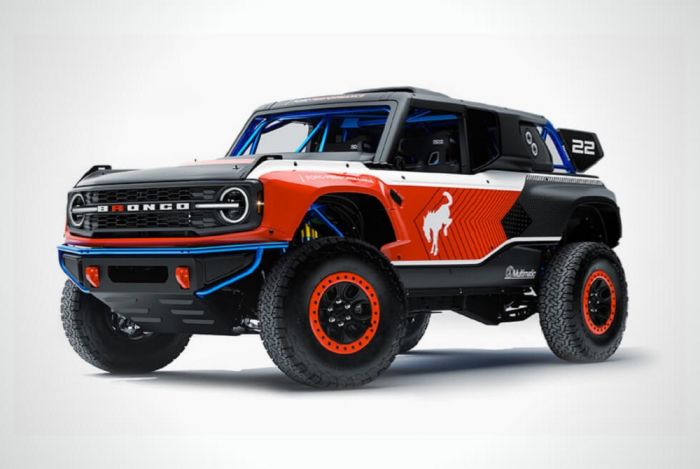
While Ford trucks were making a name for themselves on the paved tracks of NASCAR, they were also carving a path to off-road glory in the unforgiving landscapes of the Baja California Peninsula. The Baja 1000, an annual off-road race that traverses the rugged desert terrain, has become synonymous with Ford’s off-road racing dominance.
Baja 1000: The Ultimate Test
The Baja 1000 isn’t just a race; it’s a brutal test of endurance, a gauntlet thrown down to both machine and driver. The course, which stretches for hundreds of miles through scorching deserts, rocky canyons, and treacherous sand dunes, is known for its punishing conditions and unpredictable obstacles. Flat tires, mechanical failures, and extreme weather are just some of the challenges that racers face in this grueling event.
The Baja 1000 has a rich history, dating back to the 1960s, and Ford has been a major player in this legendary race since its early days. The race’s demanding nature has made it the perfect proving ground for Ford’s off-road vehicles, pushing them to their limits and inspiring innovations that have revolutionized off-road technology.
Ford’s Baja Dynasty
Ford’s success in the Baja 1000 is nothing short of legendary. Over the years, Ford has racked up an impressive number of victories in various classes, solidifying its position as a dominant force in off-road racing. Iconic Ford models like the Bronco, the F-150, and the Ranger have all tasted victory in this prestigious race, each contributing to Ford’s rich Baja legacy.
One of Ford’s most successful Baja campaigns came in the 1980s and 1990s with the legendary “Rough Riders” team. This factory-backed effort, led by drivers like Manny Esquerra, Rob MacCachren, and Steve Olliges, dominated the Baja 1000 for years, securing multiple overall victories and class wins. The Rough Riders’ success not only showcased the performance and reliability of Ford racing trucks but also helped to solidify Ford’s image as an off-road powerhouse.
Raptor: The Desert King
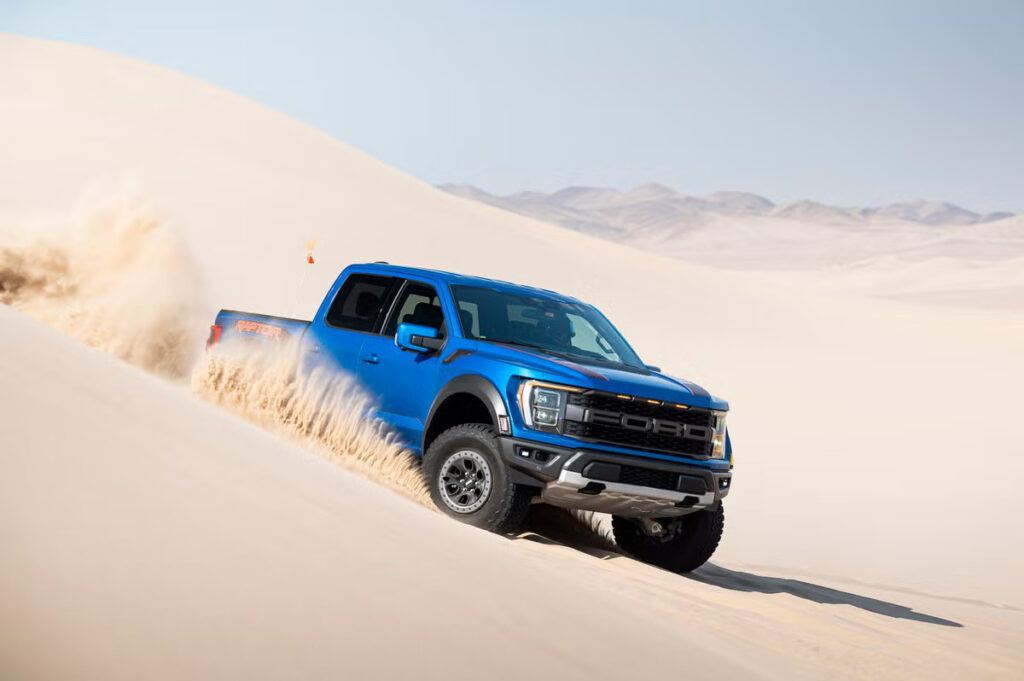
In recent years, the Ford Raptor has emerged as the undisputed king of the desert, in the realm of Ford truck racing. This high-performance off-road truck, specifically designed for tackling extreme terrain, has become the weapon of choice for many Baja racers and Ford truck racing enthusiasts. With its long-travel suspension, powerful engine, and advanced off-road technology, the Raptor has proven its ability to conquer the Baja’s challenging landscape time and time again, solidifying its reputation in Ford truck racing.
The Raptor’s success in the Baja 1000 is a testament to Ford’s commitment to pushing the boundaries of off-road performance and Ford truck racing. The truck’s evolution, from its first generation in 2010 to the latest models equipped with cutting-edge technology, reflects Ford’s dedication to innovation and its passion for off-road racing and Ford truck racing alike.
Baja Innovations
Ford’s involvement in the Baja 1000 has not only resulted in victories on the track but has also led to significant advancements in off-road technology. The harsh conditions of the race have forced Ford engineers to develop innovative solutions to improve the performance, durability, and safety of their racing trucks.
These innovations, from advanced suspension systems to specialized tires and cooling systems, have not only benefited Ford’s racing program but have also found their way into the production vehicles, making them more capable and reliable for off-road enthusiasts. Ford’s commitment to using racing as a laboratory for innovation has ensured that their trucks remain at the forefront of off-road technology.
The Future of Ford Truck Racing
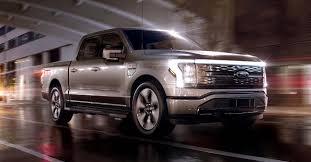
As the automotive industry shifts towards electrification and sustainability, Ford truck racing is poised to undergo a transformative evolution. Embracing the changing landscape, Ford is not only adapting but leading the charge in electric truck racing, setting a new benchmark for performance and environmental consciousness.
Electric Ford Truck Racing
Ford’s foray into electric truck racing is a bold step towards a greener future for motorsports. With the introduction of the F-150 Lightning, Ford’s first all-electric pickup truck, the company has demonstrated its commitment to electrifying its entire lineup, including its racing vehicles.
The F-150 Lightning has already made a splash in various electric racing events, showcasing the potential of electric power in a rugged and capable package. Its instant torque and smooth acceleration make it a formidable competitor on the track, while its zero-emissions operation aligns with Ford’s sustainability goals.
The development and racing of electric trucks like the F-150 Lightning are not only a testament to Ford’s engineering prowess but also a demonstration of the company’s vision for the future of truck racing. As battery technology advances and charging infrastructure expands, electric truck racing is poised to become a major force in the motorsports world, and Ford is at the forefront of this exciting transition.
Sustainability Initiatives
Ford’s commitment to sustainability extends beyond just electrifying its racing trucks. The company is actively exploring and implementing green racing technologies across its entire motorsports program. This includes the use of sustainable materials in the construction of race vehicles, the development of more efficient engines, and the exploration of alternative fuels like biofuels.
Ford is also partnering with other industry leaders to promote sustainability in motorsports. Initiatives like the FIA Environmental Accreditation Programme, which encourages racing organizations to adopt sustainable practices, are helping to transform the sport into a more environmentally responsible one.
Ford’s sustainability efforts are not only good for the planet but also good for business. By demonstrating its commitment to environmental responsibility, Ford is strengthening its brand image and appealing to a growing segment of consumers who prioritize sustainability.
Emerging Technologies
The future of Ford truck racing is not just about electrification; it’s also about harnessing emerging technologies to push the boundaries of performance and innovation. Autonomous driving technology, for example, could revolutionize the sport, enabling trucks to reach new levels of speed and precision.
Artificial intelligence (AI) is another area of potential growth for Ford truck racing. AI-powered systems could analyze vast amounts of data to optimize race strategies, improve vehicle performance, and even predict potential failures before they occur. The integration of AI into truck racing could usher in a new era of data-driven competition, where the most intelligent teams will have a distinct advantage.
Other emerging technologies like 3D printing and advanced materials could also play a role in the future of Ford truck racing. 3D printing could enable the rapid prototyping and production of custom parts, while advanced materials could make race trucks lighter, stronger, and more aerodynamic.
Ford’s commitment to innovation ensures that they will remain at the forefront of these technological advancements. By embracing emerging technologies and pushing the boundaries of what’s possible, Ford truck racing will continue to evolve, captivate fans, and inspire the next generation of racers and engineers.
Beyond the Track: Legacy of Ford Truck Racing
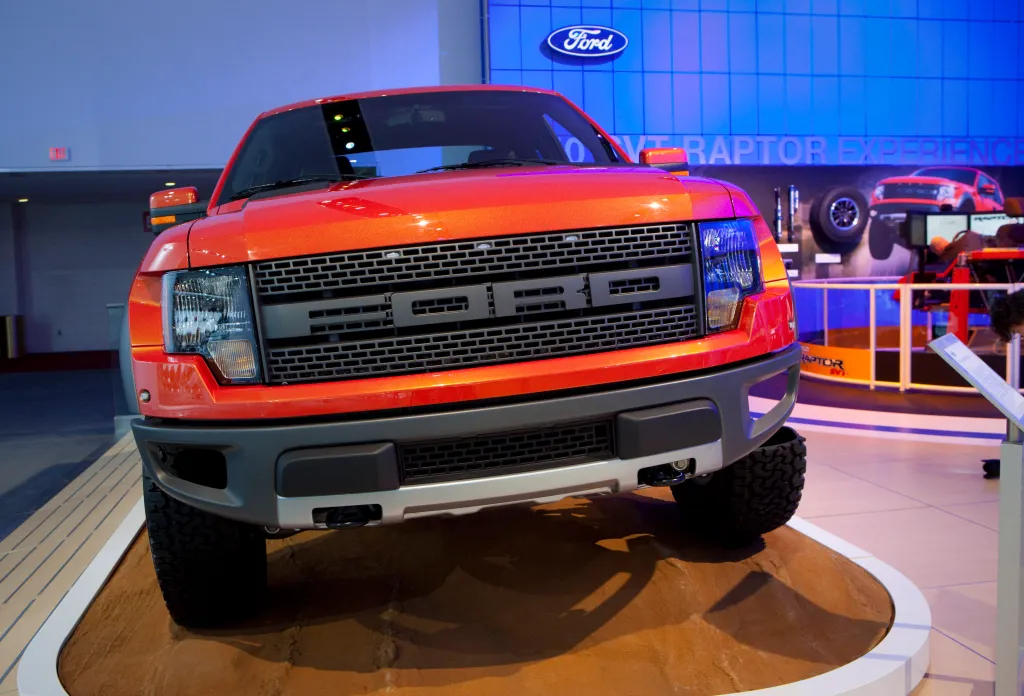
The impact of Ford’s success in truck racing extends far beyond the checkered flag. It has shaped the development of Ford’s production trucks, fostered a passionate community of enthusiasts, and solidified the brand’s image as a leader in performance and innovation. The legacy of Ford racing trucks is not just about trophies; it’s about the lasting influence on the automotive industry and the culture surrounding it.
Performance Trucks for Consumers
Ford’s racing program serves as a crucible for innovation, pushing the boundaries of what’s possible in truck performance. The technologies and lessons learned on the track are directly translated into the production vehicles, benefiting consumers who seek the same level of power, durability, and capability in their everyday trucks.
The Ford F-150 Raptor, for example, is a direct descendant of Ford’s Baja racing trucks. Its suspension, chassis, and powertrain have been honed through years of off-road competition, resulting in a production truck that can handle the most extreme terrain with ease. The same is true for the high-performance street trucks that Ford offers, which often incorporate technology and design elements derived from their racing counterparts.
By investing in racing, Ford is not only developing faster and more capable trucks for competition but also elevating the standards for its consumer vehicles. The racing program serves as a real-world testing ground, ensuring that Ford trucks are built to withstand the toughest challenges and deliver the performance that drivers demand.
Fostering a Community
Ford truck racing has created a passionate community of enthusiasts who share a love for the sport and the brand. This community extends beyond the racetrack, encompassing online forums, social media groups, and local clubs where fans gather to discuss their favorite drivers, teams, and trucks.
Ford actively engages with this community, hosting events, sponsoring races, and providing opportunities for fans to interact with their racing heroes. This fosters a sense of loyalty and belonging among Ford truck owners, creating a strong brand identity that resonates with consumers.
The community also plays a crucial role in promoting the sport of truck racing. Enthusiasts attend races, purchase merchandise, and share their passion with others, helping to grow the sport’s popularity and ensuring its continued success.
Brand Image and Marketing
Ford’s success in truck racing has had a significant impact on its brand image. The company’s victories in prestigious races like the Baja 1000 and the NASCAR Craftsman Truck Series have reinforced its reputation as a leader in performance, innovation, and engineering excellence.
The media attention and positive publicity generated by Ford’s racing accomplishments have helped to raise awareness of the brand and its products. Racing success is often associated with cutting-edge technology and superior performance, and Ford has leveraged this association to create a strong brand identity that resonates with consumers.
Ford’s marketing campaigns often feature their racing trucks, highlighting their victories and emphasizing the connection between their racing program and their production vehicles. This strategy has proven to be effective in attracting new customers and reinforcing brand loyalty among existing ones.
Conclusion
From the dusty trails of the Baja 1000 to the high-banked ovals of NASCAR, Ford’s legacy in truck racing is a testament to its unwavering commitment to performance, innovation, and the pursuit of excellence. The iconic models that have graced the track – the F-150, the Raptor, the Bronco, and the Ranger – are not just racing machines; they are symbols of Ford’s enduring spirit and its dedication to pushing the boundaries of what’s possible.
The stories of legendary drivers like Greg Biffle, Carl Edwards, and Rob MacCachren, who have piloted Ford trucks to victory, are woven into the fabric of motorsports history. Their skill, determination, and passion for racing have not only brought glory to Ford but have also inspired generations of racers and fans alike.
As Ford truck racing evolves, embracing electric power and sustainable technologies, it continues to set new benchmarks for performance and environmental responsibility. The F-150 Lightning’s foray into electric racing is just a glimpse of what the future holds, with emerging technologies like AI and autonomous driving poised to revolutionize the sport.
One thing remains certain: Ford’s commitment to truck racing is as strong as ever. The lessons learned on the track continue to shape the development of Ford’s production trucks, ensuring that they remain at the forefront of performance, capability, and innovation. The passionate community of Ford truck racing enthusiasts continues to grow, fueling the sport’s popularity and driving its continued success.
Ford’s racing legacy is not just a collection of trophies and victories; it’s a testament to the enduring spirit of innovation, the relentless pursuit of excellence, and the unwavering passion that fuels the world of motorsports. It’s a story that will continue to unfold for generations to come, inspiring new drivers, new technologies, and new chapters in the ongoing saga of Ford truck racing.